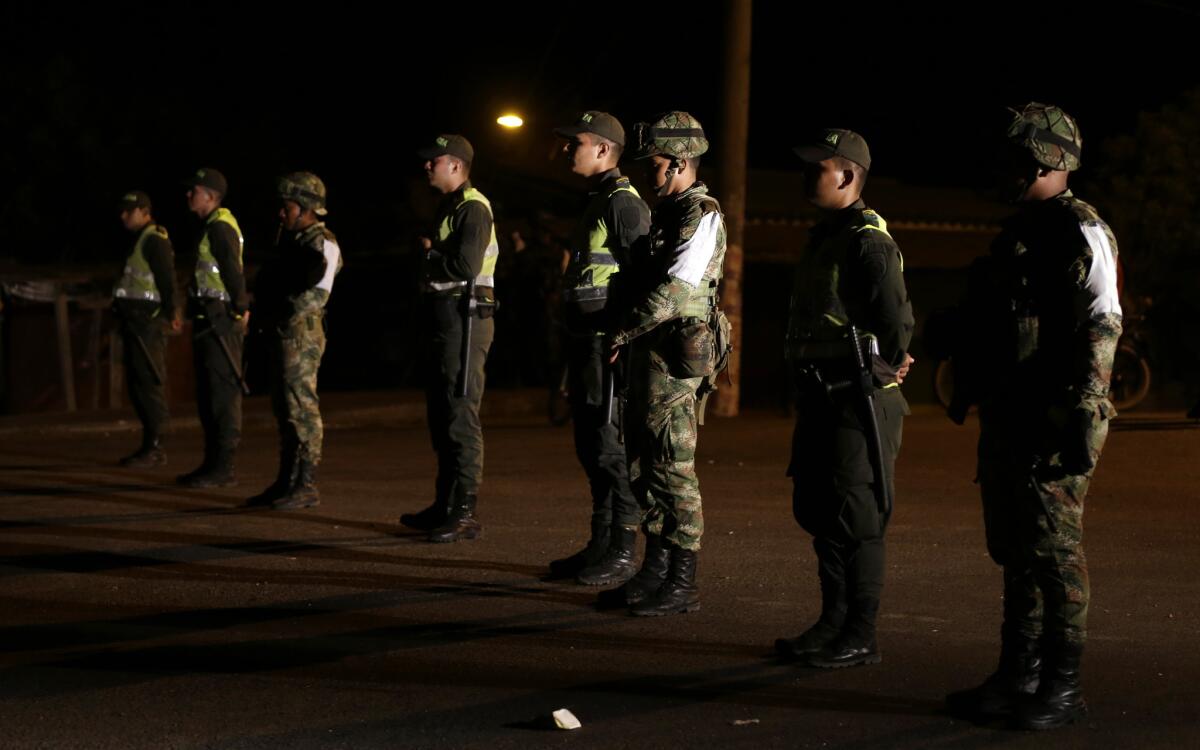Venezuela pushing resident Colombian nationals back across the border

Colombian police officers and soldiers stand guard in the town of Paraguachon along the border with Venezuela on Sept. 8.
- Share via
Reporting from Bogota, Colombia — More than 20,000 Colombians have fled or been deported from Venezuela’s western border region in the two weeks since President Nicolas Maduro began a campaign to expel them, according to United Nations figures.
The expulsions, combined with the closing of parts of the common border, have raised tensions between the two South American countries and provoked charges by Colombia of inhumane treatment of its citizens. Colombian Foreign Minister Maria Angela Holguin met in New York on Tuesday with U.N. Secretary-General Ban Ki-moon to request help.
Colombian officials in Cucuta, to which 90% of the refugees have fled, and other border cities say the expulsions have caused a humanitarian crisis. Many of the displaced had lived and worked in Venezuela for many years and left with only the possessions they could carry.
The U.N. figures were released Tuesday evening.
Also on Tuesday, Maduro ordered an extension of the border closures to northern Zulia state and said he would send 3,000 soldiers there to root out “irregulars, paramilitaries and delinquents.” A state of emergency was declared in portions of the state, which opens the way to unannounced house searches and document checks.
Maduro announced a 60-day partial closure of the border with Colombia on Aug. 24, decreeing a state of emergency and a suspension of certain constitutional rights. He charged that his country was under siege by paramilitary fighters, drug traffickers and black marketeers.
Critics say that in advance of December elections, Maduro is trying to distract Venezuelan voters from scarcities of basic foodstuffs. He blames Colombians for the chronic shortages and accuses them of controlling a massive black market in smuggled food and fuel with the complicity of some Venezuelan officials.
The highly subsidized prices of Venezuelan gasoline and foodstuffs offer the potential of huge profits for smugglers. An estimated 10% of all the gasoline refined in Venezuela, which is meant to be sold for pennies to the nation’s citizens, ends up finding its way at inflated prices to Colombia, Brazil and Caribbean nations by way of corrupt officials and smugglers.
Venezuelans are looking at what could be pivotal National Assembly elections at year’s end. Opposition candidates are hoping to gain seats because of the low approval ratings that plague Maduro, who took power in 2013 with the death of longtime leader Hugo Chavez.
Tens of thousands of Colombians have moved to Venezuela over the last half-century to seek work in the oil-based economy; many of them remain undocumented residents.
Alleging human rights violations, Colombian President Juan Manuel Santos has unsuccessfully requested a meeting with Maduro. Last week, a Colombian initiative to convene a special meeting of the Organization of American States foreign ministers to discuss the crisis was rebuffed by the alliance.
On Tuesday, Maduro said he would accept the mediation of Brazil and Argentina in the dispute, while Santos has said he favored the involvement of Uruguayan President Tabare Vasquez in attempting to reconcile the two sides. However, no such mediation process has so far been scheduled.
Special correspondents Kraul reported from Bogota and Mogollon from Caracas, Venezuela.
More to Read
Sign up for Essential California
The most important California stories and recommendations in your inbox every morning.
You may occasionally receive promotional content from the Los Angeles Times.












